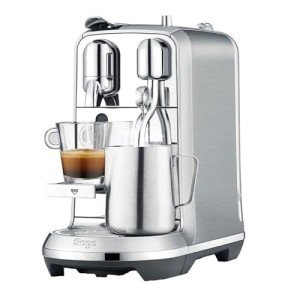The Rise of Home Espresso Machines: A Comprehensive Guide
As coffee enthusiasts continue to look for fresh and tasty brews at home, the appeal of home espresso machines has actually surged over the last few years. No longer simply the domain of cafes and cafe, these machines empower people to craft barista-quality espresso drinks from the convenience of their cooking areas. This short article will check out the numerous kinds of home espresso machines, their features, and considerations for choosing the best one. Furthermore, it will supply a choice of FAQs to assist prospective buyers make informed choices.
Types of Home Espresso Machines
Home espresso machines can be classified into several classifications based on their systems and user-friendliness. Each type has its special functions, pros, and cons.
| Type | Description | Pros | Cons |
|---|---|---|---|
| Manual Espresso Machines | Requires the user to manually control the brewing procedure, including strategies like pulling a lever to produce pressure. | - Complete control over developing procedure - Compact style | - Requires skill and practice - Time-consuming |
| Semi-Automatic Machines | Machine automates water flow and pressure, but the user still manages the dosing and period of the developing process. | - Balance of automation and control - Versatile | - Learning curve for improving methods |
| Fully Automatic Machines | Automates the whole developing process, from grinding to brewing, frequently with programmable settings for personalized beverages. | - Extremely easy to use - Quick and hassle-free | - Less control over the developing process - Higher cost point |
| Capsule or Pod Machines | Uses pre-packaged espresso pills or pods to develop coffee quickly and easily. | - Extremely easy to use - Minimal cleanup | - Limited flavor variety - More expensive per cup than ground coffee |
| Super-Automatic Machines | Integrates features of totally automatic machines with integrated mills, enabling users to brew whole bean espresso and milk-based drinks with one touch. | - All-in-one benefit - Ideal for milk-based drinks | - Often the most costly - Can be large |
Functions to Consider
When picking a home espresso machine, possible purchasers ought to consider the following functions to ensure they select a machine that satisfies their requirements:
Grinder Type:
- Built-in grinders can supply fresher grounds however might require more maintenance.
- Separate grinders enable more modification of grind size.
Pressure:
- Look for machines that produce a minimum of 9 bars of pressure, which is optimum for brewing espresso.
Water Temperature Control:
- Machines with adjustable temperature level settings enable much better extraction of flavor from beans.
Milk Frothing Options:
- Consider whether you want a manual steam wand for frothing or an automatic milk frother for benefit.
Ease of Cleaning:
- Machines with removable parts and self-cleaning functions considerably minimize cleanup time.
Size and Design:
- Ensure the machine fits conveniently in your cooking area and lines up with your aesthetic choices.
Budget:
- Set a budget before beginning your search, as costs can range significantly from affordable models to high-end machines.
Advantages of Home Espresso Machines
Owning a home espresso machine provides various advantages:
- Cost-Effective: Over time, brewing espresso at home can conserve coffee enthusiasts money compared to frequent café gos to.
- Personalization: Users can experiment with various beans, grind sizes, and brewing strategies to discover their perfect cup.
- Convenience: The capability to brew espresso whenever removes the requirement to go out to a café, particularly useful throughout late nights or early mornings.
- Quality assurance: With a home machine, people have total control over the quality of active ingredients and developing procedures.
Downsides of Home Espresso Machines
However, there are some drawbacks to think about:
- Initial Investment: High-quality espresso machines can be pricey, needing a considerable in advance investment.
- Knowing Curve: Mastering the art of espresso developing can take time and practice, which might be daunting for novices.
- Upkeep: Like any device, espresso machines require routine cleaning and upkeep to ensure optimal efficiency.
FAQs
1. What is the best type of home espresso machine for newbies?
Response: For novices, a semi-automatic machine is typically suggested as it offers a balance between control and automation, allowing you to learn the fundamentals without overwhelming complexity.
2. How much should I invest in a home espresso machine?
Response: Entry-level machines can begin around ₤ 100 to ₤ 300, while higher-end models can range from ₤ 500 to over ₤ 2000. It's vital to set a budget based on your expected use and desired features.
3. Do I require a separate grinder?
Answer: While some espresso machines include integrated mills, purchasing a different grinder enables greater customization and makes sure much better quality grounds.
4. How typically should I clean my espresso machine?
Answer: Cleaning frequency can vary by machine type, but it's typically advised to clean up the machine after each use and perform deep cleansings weekly or month-to-month, depending upon usage.
5. Can I make milk-based beverages with any espresso machine?
Response: Not all machines come with milk frothing abilities. If you take pleasure in beverages like lattes or cappuccinos, try to find a machine with a steam wand or automatic frother.
Home espresso machines are changing the method coffee aficionados enjoy their beloved brews. With Pump Espresso Machines and advanced functions offered in the market, there is something for everybody. Whether it's the pleasure of creating unique dishes or just appreciating the ideal shot of espresso, purchasing a home espresso machine can boost both the coffee-drinking experience and the quality of life for coffee fans all over. As with any financial investment, it is vital to weigh the benefits against the possible downsides and select a machine that perfectly fits both your lifestyle and preferences.

